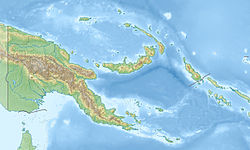1971 Solomon Islands earthquakes
| UTC time | Doublet earthquake: |
|---|---|
| A: 1971-07-14 06:11:29 | |
| B: 1971-07-26 01:23:22 | |
| ISC event | |
| A: 782181 | |
| B: 782684 | |
| USGS-ANSS | |
| A: ComCat | |
| B: ComCat | |
| Local time | |
| A: 16:11:29 | |
| B: 11:23:22 | |
| Magnitude | |
| A: mb6.0, Ms7.8 (ISC) Mw 8.0 (ANSS) | |
| B: mb6.6, Ms7.7 (ISC) Mw 8.1 (ANSS) | |
| Depth | A: 45 km (28 mi) B: 37 km (23 mi)[1] |
| Max. intensity | A: MMI IX (Violent) B: MMI VI (Strong)[2] |
| Casualties | 2 dead, 5 injured[2] |
The 1971 Solomon Islands earthquakes occurred in the northern part of the Solomon Islands, within Papua New Guinea as a doublet earthquake. The first large shock occurred on July 14 at 06:11 UTC with a magnitude of Mw 8.0. The second large event occurred on July 26 at 01:23 UTC with a magnitude of Mw 8.1. The initial event on July 14 caused a tsunami, which was observed in Rabaul.[3] The earthquake of July 26 triggered a tsunami with a 3.4 m (11 ft) runup in New Britain.[4]
Shallow, large thrust earthquakes in the Solomon Islands tend to occur in multiplets. Examples of such earthquakes include the doublets occurred in 1971, 1974, and 1975. The 1971 doublet occurred at the junction of two trenches. The July 14 earthquake is located in the northwestern Solomon Islands Trench, while the July 26 earthquake ruptured the northeastern New Britain Trench. The July 14 earthquake and the July 26 earthquake were caused by the subduction of the Solomon Sea plate beneath the Pacific plate and the Bismark Sea Plate, respectively.[5] The 1971 sequence had the largest earthquake in 50 years in this region as it occurred.[6]
See also
[edit]- List of earthquakes in 1971
- List of earthquakes in Papua New Guinea
- List of earthquakes in the Solomon Islands
References
[edit]- ^ Engdahl, E. R.; Vallaseñor, A. (2002). "Global seismicity: 1900–1999" (PDF). International Handbook of Earthquake & Engineering Seismology. Part A, Volume 81A (First ed.). Academic Press. p. 682. ISBN 978-0124406520.
- ^ a b National Geophysical Data Center / World Data Service (NGDC/WDS) (1972), Significant Earthquake Database (Data Set), National Geophysical Data Center, NOAA, doi:10.7289/V5TD9V7K
- ^ Sinadinovsk, C.; Somerville, M.; McCue, K.F.; Talai, B. (2001). "Spectral characterisation of tsunamis and seiches caused by tectonism and volcanism in Rabaul, Papua New Guinea". Natural Hazards. 24 (3). Kluwer Academic Publishers: 285–294. doi:10.1023/a:1012274601026. S2CID 128775056.
- ^ ITIC (1996), Tsunami newsletter – January 1996 (PDF), International Tsunami Information Center, p. 7
- ^ Schwartz, S. Y.; Lay, T.; Ruff, L. (1989). "Source process of the great 1971 Solomon Islands doublet" (PDF). Physics of the Earth and Planetary Interiors. 56 (3–4). Elsevier: 294–310. Bibcode:1989PEPI...56..294S. doi:10.1016/0031-9201(89)90164-7. hdl:2027.42/27784.
- ^ Lay, T.; Kanamori, H. (1980). "Earthquake doublets in the Solomon Islands" (PDF). Physics of the Earth and Planetary Interiors. 21 (4). Elsevier: 283–304. Bibcode:1980PEPI...21..283L. doi:10.1016/0031-9201(80)90134-x.
External links
[edit]- The International Seismological Centre has a bibliography and/or authoritative data for this event.

